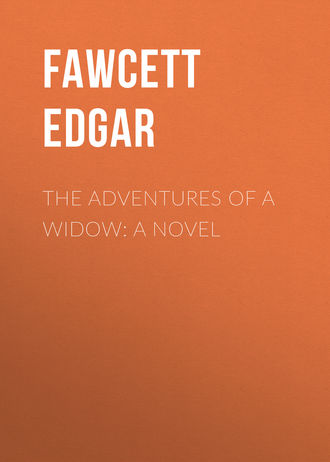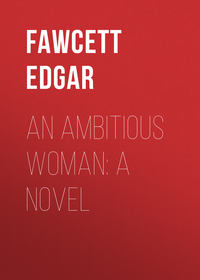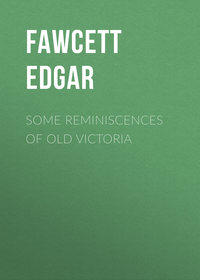 полная версия
полная версияThe Adventures of a Widow: A Novel
Pauline soon afterwards started on foot for the residence of Mrs. Dares. It was nearly dusk. She had determined to set before this good and trusted woman every detail of her present discomfort, and while confessing her matrimonial promise as regarded the marriage with Kindelon on the morrow, to exhort counsel, advice, guidance, justification. Being a woman, and having made up her mind, justification may have been the chief stimulus of her devout pilgrimage.
The great bustling city was in shadow as she rang the bell at Mrs. Dares's residence.
A strange, ominous, miserable fear was upon her while she did so. She could not account for it; she strove to shake it off. She remembered her own reflections: "All is over now. I face a new life."
But she could not dismiss the brooding dread while she waited the answer of her summons at Mrs. Dares's door.
XV
The tidy young negress opened the door soon afterwards. Pauline asked for Mrs. Dares. The answer came that Mrs. Dares was at home.
"I wish to see her alone," said Pauline.
"Miss Cora's got a gent'man in the back room," came the answer, "but there's nobody right here."
Between "right here" and the "back room," Pauline was soon shown the difference. As she sat in a little prettily-furnished apartment, awaiting the appearance of Mrs. Dares, she readily apprehended that some sort of a chamber lay behind. This was, reasonably, the Dareses' dining-room. But she heard voices from beyond the rough decorative woollen tapestry which intervened in heavy concealing folds.
At first, seated quietly and thinking of just what she should say to Mrs. Dares, Pauline quite disregarded these voices.
"I shall tell the plain, unvarnished truth," she reflected. "I shall not leave a single detail. I shall trust her judgment absolutely."
A moment later she started, with a recognizing sense that she had heard a familiar tone from one of the voices behind the tapestry. Evidently a man was speaking. She rose from her seat. She had approached the curtain instinctively before realizing her act. A new impulse made her withdraw several steps from it. But the voice had been Kindelon's, and she now clearly heard Kindelon speak again.
"Cora!" she heard him say, "there are certain wrongs for which no reparations can be given. I know that the wrong I have done you is of this sort. I don't attempt to exculpate myself. I don't know why I came here to bid you this farewell. It was kind of you to consent to see me. Hundreds of other women would have refused, under like conditions. But you have often said that you loved me, and I suppose you love me still. For this reason you may find some sort of consolation hereafter in the thought that I have made an ambitious marriage which will place me high in the esteem of the world, which will give my talents a brilliant chance, which will cause men and women to point to me as a man who has achieved a fine and proud success… Good-by, Cora… Let me take your hand once – just once – before I go. I'll grant you that I've behaved like a scamp. I'll grant everything that can be said in my own disfavor. Good heavens! don't look at me in that horribly reproachful way, you – you make me willing to renounce this marriage wholly! Cora, I will do so if you'll pardon the past! I'll come back to you, I'll devote my future life to you! only tell me that you forgive and forget!"
"No, no," Pauline now heard a struggling and seemingly agonized voice reply. "There is no undoing what you have done. Keep your promise to her, as you have broken your faith with me. I do not say that my love is dead yet; I think it will not die for a long time … perhaps not for years. But my respect is wholly dead… I will not touch your hand; I will not even remain longer in your presence. I – I have no vengeful feeling toward you. I wish you all future happiness. If you shine hereafter as your talents deserve, I shall hear of your fame, your triumph, with no shadow of bitterness in my soul. And my chief hope, my chief anxiety, will be for the woman whom you have married. I know her enough to know that she is full of good impulses, full of true and fine instincts. You will go to her with an aching conscience and a stained honor. But I pray that after she has lifted you into that place which you seek to gain through her, she may never know you as I have known you – never wake to my anguish of disappointment – never realize my depths of disillusion!"
Pauline waited to hear no more. She thrust aside the drapery of the doorway and passed into the next room.
Cora uttered a swift and smothered cry. Kindelon gave a terrible start. Then a silence followed. It seemed to Pauline a most appreciable silence. She meant and wished to break it, yet her speech kept defying her will, and resisted her repeated effort at due control. But at length she said, looking straight at Kindelon, —
"I have heard – I did not mean to hear – I don't want you to say a single word – there is nothing for you to say. I simply appear before you – before you both! I – I think that is enough. I know every thing now. You … must have been certain that if I had previously known – that if you had not told me a falsehood I … I … should never…"
And then poor Pauline reeled giddily, putting forth both hands in a piteous, distraught way… When Kindelon caught her she had already lost consciousness…
The sense of blank was a most acute one when she awoke. Her first clear thought was, "How long have I been unconscious?" … And then came remembrance, and with remembrance the pain of a deep-piercing hurt.
No one was near by except Mrs. Dares. Pauline lay upon a lounge; she felt the yielding of cushions beneath her head and shoulders. Her first audible sign of revived consciousness was a little tremulous laugh.
"That's you, Mrs. Dares?" she then said. "I – I must have fainted. How funny of me! I – I never fainted before."
Mrs. Dares put both arms about her, and kissed her twice, thrice, on the cheek.
"My poor, dear, unhappy lady!" she said. "I am sorry – so miserably sorry."
Pauline repeated her tremulous laugh. She was beginning to feel the reassertion of physical strength. "I – I came here to see only you, Mrs. Dares," she now said, "but it was fated otherwise. And … and yet it has all been better – far better." Here she laughed again, and a little hysterically. "Oh, how superb a failure I've made of it, haven't I? I thought the 'Morning Monitor' had dealt me my last coup. But one other still remained!"
She lay silent for some little time, after this, and when Mrs. Dares presently spoke to her the lids which had dropped over her eyes did not lift themselves. It was so sweet, so tender, so exquisitely gentle a voice that it brought not the slightest exciting consequences.
"He is greatly to blame. I do not excuse him any more than you will. But you must not think the worst of him. You must think him weak, but you must not think him entirely base. I look at his conduct with impartial eyes. I try to look at everybody with impartial eyes. He was far below you in the social scale – that is the phrase which means inferiority nowadays, and I am afraid it will mean inferiority for many a year to come. He had engaged himself to my dear Cora. He meant to marry her. Then he met you. Everything about you dazzled and charmed him. It was yourself as much as your position, your wealth, your importance. He cared for you; he was enchanted by you; his nature is not a deep nature, though his intellect is large and keen. He is almost the typical Irishman, this Kindelon – the Irishman who, in statesmanship, in governance, in administrative force, has left poor Ireland what she is to-day. He meant well, but he had not enough morale to make this well-meaning active and cogent. The temptation came, and he yielded at once. There was no premeditated dishonor. The strain was put upon him and he could not bear the strain – that is all. Such men as he never can bear such a strain. There was not a hint of coldbloodedness in his conduct – there was none of the fortune-hunter's deliberate method. There was, indeed, no method at all; there was nothing except an inherent moral feebleness. Brilliant as he is, exceptional as he is, he can no more help consent and acquiescence in any matter which concerns his personal, selfish desires, than the chameleon can help taking the tints of what surrounds it. And I do not believe that he knows, at this hour, whether he loves you or my poor Cora the best. That is he – that is Kindelon – that is the fascinating, distressing race that he represents. He loved you both; his big, expansive Irish heart was quite capable of doing that. But his insecure, precarious conscience was incapable of pointing to him the one straight, imperative path. Hence your own sorrow, my dear, ill-used lady, and hence the sorrow of my poor unfortunate Cora!"
Pauline's eyes slowly unclosed as Mrs. Dares's last words were spoken.
"You speak like a sybil!" she murmured.
"But you speak too late. If I had only talked with you a little sooner! I should have been so prepared for such words then! Now they only come to me like mockery and … and sarcasm!"
Again Mrs. Dares stooped and kissed her.
"God knows," she said, "that I mean them for neither!"
"God help me from believing that you do!" answered Pauline. She raised herself, and flung both arms about Mrs. Dares's neck, while a sudden paroxysm of sobs overmastered and swayed her.
XVI
By a little after nine o'clock, this same evening, Pauline was driven in a carriage to her own residence.
She alighted with excellent composure, rang the bell and was promptly admitted.
But she had no sooner entered the hall than she found herself face to face with Courtlandt.
He was in evening dress; he looked thoroughly his old self-contained self. Pauline passed at once into the little reception-room just off the hall. Courtlandt followed her. She sank into a chair, slowly untying the strings of her bonnet. A brisk fire crackled on the hearth; she stared into it.
"So you came to me," she said, with a kind of measured apathy.
"Yes," said Courtlandt. "I obeyed the message that you sent me."
Pauline impetuously turned and looked at him. The fire-light struck her face as she did so, and he saw that her gray eyes were swimming in tears.
She made no attempt to master her broken voice. "O Court," she said, "it was ever so good of you to come! I almost doubted if you would! I should have remembered that you – well, that you cared for me in another than a merely cousinly way. But there was no one else – that is, no one near me in blood. It is wonderful how we think of that blood-kinship when something dreadful happens to us. We may not recall it for years, until the blow comes. Then we feel its force, its bond, its claim… I want you to sit down beside me, Court, and quietly listen. You were always good at listening. Besides, you will have an immense satisfaction, presently; you will learn that your prophecies regarding him were correct. My eyes are open – and in time. I shall never marry him. I shall never marry any one again. And now, listen…"
For a long time, after this, Courtlandt showed himself the most patient of auditors. But he was silent for a good space after his cousin had at length ended, while the fire sputtered and fumed behind the silver filigrees that bordered its hearth, as though it were delivering some adverse, exasperated commentary upon poor Pauline's late disclosures.
But presently Courtlandt spoke. "I think you have had a very fortunate escape," he said. "And I hope you mean, now, to come back and be one of us, again."
"What a way of putting it!" she exclaimed, with a great quivering sigh.
"There's no other way to put it. Theory's one thing and practice another. As long as the world lasts there will be a lot of people in every land who are better and hold themselves better than a huge lot of other people. One can argue about this matter till he or she is black in the face; it's no use, though; the best way to get along is to take things as you find them. You and I didn't make society, so we'd better not try to alter it."
Pauline gave a weary little smile. Her tears had ceased; she was staring into the fire with hard, dry, bright eyes.
"O Court," she said, with a pathetic little touch of her old cruelty, "I'm afraid you don't shine as a philosopher. You are better as a prophet; what do you say of Cora Dares and him? Will they marry?"
"Yes," returned Courtlandt unhesitatingly. "And I dare say he will make her an excellent husband. Didn't you tell me that she was an artist?.. Well, he's an editor, a sort of general scribbler, so they will be on a delightful equality. They'll marry. You say I'm a prophet; depend upon it, they'll marry sooner or later."
"You make me recall that you are Aunt Cynthia's nephew," said Pauline, with another weary smile. She was in a very miserable mood. Her wound still bled, and would bleed, as she knew, for many a day.
Courtlandt's preposterously trite and commonplace little axiom had already begun to echo itself in a kind of rhythmical mockery through her distressed brain: "The best way to get along is to take things as you find them."
Was it the best way, after all? Was thinking for one's self and living after one's own chosen fashion nothing but a forlorn folly? Was passivity wisdom, and individualism a snare?
The fire crackled on. There was more silence between the two cousins. The hour was growing late; outside, in the streets, you heard only the occasional rolling of carriage-wheels.
"By the way, speaking of Aunt Cynthia, Court, – will she ever notice me again?"
"Certainly she will."
"Isn't she furious?"
"That newspaper article has repressed her fury. She's enormously sorry for you. Aunt Cynthia would never find it hard, you know, to be enormously sorry for a Van Corlear; she came so near to being one herself; a Schenectady is next door to it."
"Yes, I understand," mused Pauline. She was still staring into the fire. "There is that clannish feeling that comes out strong at such a time … Court, I will write to her."
"Do, by all means."
"Not an apology, you know, but a … well, a sort of pacific proposal."
"Do, you'll find it will be all right, then. Aunt Cynthia would never put on any grand airs to one of her own race; she has too much respect for it…"
The longest silence of all now ensued. The fire had ceased to crackle; its block of crumbled coal looked like the fragments of a huge crushed ruby. Pauline did not know that Courtlandt was watching her when she suddenly heard him say, —
"You're going to have a hard fight, Pauline, but you'll come out of it all sound – never fear. I suppose he was the sort of chap to play the mischief with a woman, if she once gave him a chance."
"O Court," came the melancholy answer, "I wasn't thinking of him, just then. I was thinking of what my life has meant! It seems to me, now, like a broken staircase, leading nowhere. Such a strange, unsatisfactory life, thus far!"
"All lives are that, if we choose to look on them so," returned Courtlandt. "It is the choosing or not choosing to look on them so that makes all the difference… Besides, you are young yet."
"Oh, I am seventy years old!" she cried, with a little fatigued moan.
"In a year from now you will have lapsed back into your normal age."
"I can't believe it!"
"Wait and see."
"Ah, I shall have to do a good deal of waiting – for nothing whatever!"
"I too shall wait," said Courtlandt grimly.
She suddenly turned and scanned his face. "For what?" she sharply questioned.
"For you."
Pauline threw back her head, with a brief, bitter laugh. "Then you will have to wait a long time!" she exclaimed, with sorrowful irony.
"I expect to do that," answered Courtlandt, more grimly still. "And I am a good prophet. You told me so."



